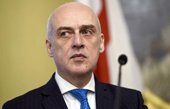
FM Zalkaliani meets with Russian Foreign Minister Sergei Lavrov
By Inga Kakulia
Monday, September 30
On September 26, Within the framework of the 74th session of the UN General Assembly, with the initiative and organization of Switzerland, the meeting between the Minister of Foreign Affairs of Georgia and the Minister of Foreign Affairs of the Russian Federation was held. Switzerland has represented Russia's interests in Georgia and Georgia's interests in Russia since 2009.
According to the statement of the Ministry of Foreign Affairs of Georgia, the main topic of discussion at the meeting was the occupation of Georgian territories. The sides discussed the current security environment and developments in the occupied territories, as well as issues concerning Georgia-Russia relations.
Comment made by the Georgian Minister before this meeting highlighted the support of the international community regarding this meeting:
“The partners support this position and believe that it is necessary to use dialogue and take diplomatic steps to ensure that the force exercising control over the occupied regions of Georgia sees the inadmissibility of continuing this process. Naturally, Georgia will act in close coordination with its partners,” said Zalkaliani.
According to the Georgian Foreign Minister, there is no illusion that there will be any breakthrough after the meeting, but the initiative of the Swiss Confederation was a good opportunity for the Georgian side to reaffirm its position.
When talking with the media representatives after the meeting Georgian Minister said that he had the opportunity to say to the Russian Minister what steps Georgia has taken, including the Karasin-Abashidze format, the non-use of force that Georgia has followed through and is asking for the same from the Russian Federation. Two sides discussed the issue of the return of internally displaced persons, as well as the existence of international security mechanisms, which is one of the main pillars of the Geneva talks, the inadmissibility of what is happening in the occupied territories, with the people who live there and encounter serious humanitarian problems, not to mention the political aspect.
Zalkaliani reassured the public that this meeting does not indicate the change in the discussion format with Russia.
“I have been assured that these formats (the Geneva and the Abashidze-Karasin format) will continue within those frameworks and mechanisms as before,” noted Zalkaliani.
The Opposition largely views this meeting as a negative development or a waste of time.
Tina Bokuchava, The member of the “United National Movement”, Bokuchava suggests that it is possible for such bilateral meetings to slowly weaken the Geneva format and then replace it, which Bokuchava believes, will be extremely worrying and make it impossible to actualize the de-occupation issue.
Ada Marshania from the Alliance of Patriots welcomes the meeting between Davit Zalakliani and Sergei Lavrov but says it’s too late for such meetings now.
The Meeting has received some mixed feedback. According to the Acting Ambassador of the US, Elizabeth Rood, the US welcomes the meeting of the Georgian and Russian Foreign Ministers. “As a strategic partner of Georgia, the US strongly supports Georgia's sovereignty and territorial integrity,” said Elizabeth Rood.
International partners have been more supportive of this meeting, with the OSCE Chairman-in-Office, Slovak Foreign Minister Miroslav Lajcak welcoming the meeting.
"Today's meeting between the Foreign Ministers of Georgia and Russia, mediated by Switzerland, is important: it shows that there is hope for constructive dialogue that can reduce tensions and enhance stability, which is beneficial to all citizens of the OSCE region," Lajcak wrote on Twitter.
EU External Action Service also stated that the meeting between Davit Zalkaliani and Sergei Lavrov was an important opportunity to discuss regional issues, to reduce tensions in Georgian-Russian relations and to reduce the influence of these tensions on citizens. Dialogue is important for a peaceful resolution of the dispute, which the EU fully supports.


